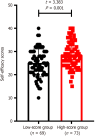Study on psychological resilience and associated influencing factors in lung cancer patients with bone metastases
- PMID: 39319225
- PMCID: PMC11417656
- DOI: 10.5498/wjp.v14.i9.1326
Study on psychological resilience and associated influencing factors in lung cancer patients with bone metastases
Abstract
Background: Evaluating the psychological resilience of lung cancer (LC) patients helps understand their mental state and guides future treatment. However, there is limited research on the psychological resilience of LC patients with bone metastases.
Aim: To explore the psychological resilience of LC patients with bone metastases and identify factors that may influence psychological resilience.
Methods: LC patients with bone metastases who met the inclusion criteria were screened from those admitted to the Third Affiliated Hospital of Wenzhou Medical University. The psychological scores of the enrolled patients were collected. They were then grouped based on the mean psychological score: Those with scores lower than the mean value were placed in the low-score group and those with scores equal to or greater than the mean value was placed in the high-score group. The baseline data (age, gender, education level, marital status, residence, monthly income, and religious beliefs), along with self-efficacy and medical coping mode scores, were compared.
Results: This study included 142 LC patients with bone metastases admitted to our hospital from June 2022 to December 2023, with an average psychological resilience score of 63.24 ± 9.96 points. After grouping, the low-score group consisted of 69 patients, including 42 males and 27 females, with an average age of 67.38 ± 9.55 years. The high-score group consisted of 73 patients, including 49 males and 24 females, with a mean age of 61.97 ± 5.00 years. χ 2 analysis revealed significant differences between the two groups in education level (χ 2 = 6.604, P = 0.037), residence (χ 2 = 12.950, P = 0.002), monthly income (χ 2 = 9.375, P = 0.009), and medical coping modes (χ 2 = 19.150, P = 0.000). Independent sample t-test showed that the high-score group had significantly higher self-efficacy scores (t = 3.383, P = 0.001) and lower age than the low-score group (t = 4.256, P < 0.001). Furthermore, multivariate logistic regression hazard analysis confirmed that self-efficacy is an independent protective factor for psychological resilience [odds ratio (OR) = 0.926, P = 0.035, 95% confidence interval (CI): 0.862-0.995], while age (OR = 1.099, P = 0.003, 95%CI: 1.034-1.169) and medical coping modes (avoidance vs confrontation: OR = 3.767, P = 0.012, 95%CI: 1.342-10.570; resignation vs confrontation: OR = 5.687, P = 0.001, 95%CI: 1.974-16.385) were identified as independent risk factors. A predictive model based on self-efficacy, age, and medical coping modes was developed. The receiver operating characteristic analysis showed an area under the curve value of 0.778 (95%CI: 0.701-0.856, P < 0.001), indicating that the model has good predictive performance.
Conclusion: LC patients with bone metastases are less psychologically resilient than the general population. Factors such as self-efficacy, age, and medical coping modes influence their psychological resilience. Patients with low self-efficacy, old age, and avoidance/resignation coping modes should be closely observed.
Keywords: Bone metastases; Clinical evaluation; Influencing factors; Lung cancer; Psychological resilience.
©The Author(s) 2024. Published by Baishideng Publishing Group Inc. All rights reserved.
Conflict of interest statement
Conflict-of-interest statement: All the authors report no relevant conflicts of interest for this article.
Figures


Similar articles
-
Correlations of resilience with coping styles and quality of life in patients with malignancies.World J Psychiatry. 2025 Apr 19;15(4):100573. doi: 10.5498/wjp.v15.i4.100573. eCollection 2025 Apr 19. World J Psychiatry. 2025. PMID: 40309588 Free PMC article.
-
[Influence of educational status, burn area and coping behaviors on the complication of psychological disorders in severely burned patients].Zhonghua Shao Shang Za Zhi. 2013 Apr;29(2):195-200. Zhonghua Shao Shang Za Zhi. 2013. PMID: 23985213 Chinese.
-
Resilience and its correlates among first ischemic stroke survivors at acute stage of hospitalization from a tertiary hospital in China:a cross-sectional study.Aging Ment Health. 2020 May;24(5):828-836. doi: 10.1080/13607863.2018.1550630. Epub 2018 Dec 31. Aging Ment Health. 2020. PMID: 30596461
-
Influencing Factors of Psychological Resilience in Stroke Patients: A Systematic Review and Meta-Analysis.Arch Clin Neuropsychol. 2024 Jul 24;39(5):644-654. doi: 10.1093/arclin/acad107. Arch Clin Neuropsychol. 2024. PMID: 38324660
-
Psychological interventions for people with hemophilia.Cochrane Database Syst Rev. 2020 Mar 18;3(3):CD010215. doi: 10.1002/14651858.CD010215.pub2. Cochrane Database Syst Rev. 2020. PMID: 32187661 Free PMC article.
Cited by
-
Profiles of resilience and patient activation among patients with colorectal cancer and an enterostomy: A latent profile analysis.Asia Pac J Oncol Nurs. 2025 Aug 6;12:100768. doi: 10.1016/j.apjon.2025.100768. eCollection 2025 Dec. Asia Pac J Oncol Nurs. 2025. PMID: 40896755 Free PMC article.
References
-
- Wen H, Liang C. Effects of Lobectomy versus Sub-Lobar Resection on the Survival in Adults with Stage IA Left Upper Lobe Non-Small Cell Lung Cancer: A Retrospective Cohort Study Based on the Surveillance, Epidemiology, and End Results Database. Oncology. 2024;102:525–532. - PubMed
-
- Leiter A, Veluswamy RR, Wisnivesky JP. The global burden of lung cancer: current status and future trends. Nat Rev Clin Oncol. 2023;20:624–639. - PubMed
-
- Bray F, Laversanne M, Sung H, Ferlay J, Siegel RL, Soerjomataram I, Jemal A. Global cancer statistics 2022: GLOBOCAN estimates of incidence and mortality worldwide for 36 cancers in 185 countries. CA Cancer J Clin. 2024;74:229–263. - PubMed
-
- Luo YH, Luo L, Wampfler JA, Wang Y, Liu D, Chen YM, Adjei AA, Midthun DE, Yang P. 5-year overall survival in patients with lung cancer eligible or ineligible for screening according to US Preventive Services Task Force criteria: a prospective, observational cohort study. Lancet Oncol. 2019;20:1098–1108. - PMC - PubMed
LinkOut - more resources
Full Text Sources
Miscellaneous

